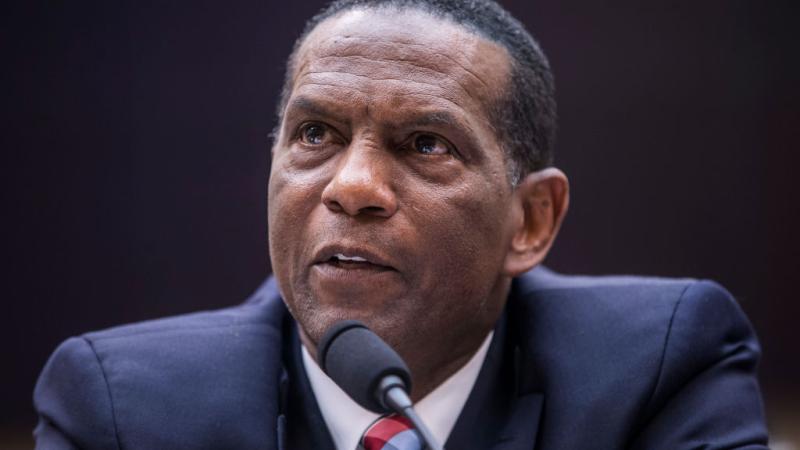Biden’s Iran policy provides funds to Islamic fundamentalist regime amid enduring terror threats
Biden’s sanctions relief and reduced pressure on Iranian proxy groups have eroded U.S. deterrence with Iran, security expert warns.
Flush with cash from the Biden administration’s easing of sanctions, Iran has not been deterred and has attempted to conduct nearly 20 operations and terrorist attacks abroad since President Joe Biden took office, according to a newly unclassified memo from the National Counter Terrorism Center (NCTC).
Evidence of Iran’s continued pursuit of foreign operations or attacks prompted warnings from NCTC about the enduring global terror threat from the Islamic Republic, according to an internal government memo reviewed by Just the News.
The memo from NCTC warns that Iran continues to possess the capabilities to “conduct terrorist operations against its perceived enemies worldwide,” with Jewish and Israeli interests and Iranian dissidents being the primary targets.
This terror threat from the Iranian regime endures, according to one security expert, because the Iranian regime is not being properly deterred by the Biden Administration, which has provided the regime billions in sanctions relief and reduced pressure on its proxies in the region.
“[What] happened after President Trump took that decisive action [striking Qasim Soleimani] is the Iranians were brushed back from their terroristic activities. They stopped for at least a year,” Victoria Coates, former deputy national security advisor to President Trump, said on the "Just the News, No Noise" TV show last week.
“And it was only after the Biden administration came in they took the Houthis off the Foreign Terrorist Organization list, this kind of action, this kind of appeasement that they started pushing back against us again. So this is the kind of thing they understand,” Coates continued.
The unclassified memo designated "for official use only” and reviewed by Just the News, highlights 21 disrupted terror plots on every continent, primarily targeting Jewish and Israeli interests and individuals as well as dissidents and critics of the Iranian regime. At least two disrupted plots were discovered in the United States against “antiregime dissidents,” Just the News reported yesterday.
“These operations underscore [Iran’s] ability to build operational infrastructure worldwide, including in the United States,” the memo concludes.
The NCTC warned that despite attacks being thwarted Iran has not been deterred in its pursuit of operations against perceived threats abroad.
Nineteen of the planned attacks or operations recorded by the NCTC occurred after President Biden was inaugurated and reversed the maximum pressure campaign against Iran that his predecessor implemented. This reversal has included sanctions relief which saw billions flow into the Iranian regime’s coffers. It also included reducing the pressure on the Houthi organization from Yemen, an Iran-backed proxy.
The Iranian-backed Houthis have been conducting a campaign of missile attacks against shipping in the Red Sea, including U.S. military vessels.
Shortly after Biden took office, his administration reversed Trump’s foreign terrorist organization designation of the Houthis—the Iran-backed group that is engaged in the Yemeni civil war.
The Biden State Department cited the urgency of the humanitarian situation in the country as the reason it revoked the designation. Previously, the terrorist designation for the group limited the aid that could be provided to the country.
The Houthis are now at the epicenter of the unstable situation in the broader Middle East as the group continues to launch missiles at and attack commercial shipping vessels in the Red Sea. These attacks have diverted approximately 80% of ships on the Suez Canal route to travel around the African Cape of Good Hope instead, according to Container News.
U.S. troops in the region have also come under fire from other Iranian proxies, especially in Iraq, which has prompted U.S. strikes in response.
In addition to reversing the terror designation of an Iran-backed proxy, the Biden Administration has provided billions in sanctions relief to the Islamic Republic for years and even recently as tensions between the United States and Iran have grown amid the ongoing Israel-Hamas war.
In November, even as tensions between Israel and its neighboring Iran proxies heated up following the Oct. 7, 2023, terrorist attack by Hamas, the Biden Administration continued to provide sanctions relief, including a waiver for Iraq to transfer approximately $10 billion in payments to Iran for electricity. The payment was previously held because of U.S. sanctions.
Earlier in his administration, President Biden had agreed to transfer $6 billion in Iranian funds frozen abroad in exchange for the release of five U.S. citizens detained in the Islamic Republic. The move was widely criticized by Republicans because of Iran’s reputation as a state sponsor of terrorrism.
Coates believes the Biden Administration’s efforts to secure a new Iran nuclear deal, which it attempted to facilitate with the billions in sanctions relief and by removing its proxies from foreign terrorist lists in the United States is what ultimately eroded deterrence with Iran.
“The Israelis understood it [deterrence] and understand it, President Trump understands it. This is this is how you handle them. You don’t…nobody wants to get into escalatory war in the Middle East, but if you don't stand up to them, they're gonna keep bullying us,” Coates said of President Trump’s previous maximum pressure police regarding Iran.
Rep. Eli Crane, R-Ariz., also criticized the Biden Administration’s weakness when it comes to sanctions relief and the terror threat and compared it to what he termed as “peace through strength” during the Trump Administration.
“[When] you look at why Iran is why Iran is posturing, and why they are behaving the way they are…why wouldn't they? They hate us. They consider us the great Satan. Okay. And the exact opposite of peace through strength, which is what we had under President Trump,” Crane told the John Solomon Reports podcast on Thursday.
“[We] have chaos and violence through weakness and incompetence under this administration. I mean, you see it across the board,” he continued.
The State Department did not immediately respond to a request for comment from Just the News.
President Biden’s national security team recently met to consider options for responding to the Houthi’s Red Sea attacks amidst public pressure, according to reports. On Thursday night, the United States and the United Kingdom carried out a series of strikes against Houthi positions in Yemen.
"Today, at my direction, U.S. military forces—together with the United Kingdom and with support from Australia, Bahrain, Canada, and the Netherlands—successfully conducted strikes against a number of targets in Yemen used by Houthi rebels to endanger freedom of navigation in one of the world’s most vital waterways," President Biden said in a statement released by the White House.
The statement did not contain any references to Iran. However, the President explained that these strikes are a "clear message that the United States and our partners will not tolerate attacks on our personnel or allow hostile actors to imperil freedom of navigation in one of the world’s most critical commercial routes."
Critics largely voiced their approval Thursday night of President Biden's decision to retaliate against the Houthis, though continued to raise concerns about U.S deterrence posture more broadly.
"Terrorists know only the language of force and it is about time the administration acted on that fact. This action should have been taken weeks ago," Florida GOP Senator Rick Scott posted to X. "Biden must now act every day to end the ability of Houthi forces and all Iran-back terrorists to attack the US and our partners."
"Very supportive of the Biden Administration’s decision to strike Houthi rebels who have been harassing international shipping and trying to attack Israeli and American interests," South Carolina GOP Senator Lindsey Graham posted to X. "The only language radical Islamic groups understand is force. I hope the Biden Administration understands that their deterrence policy has completely failed," he continued.













